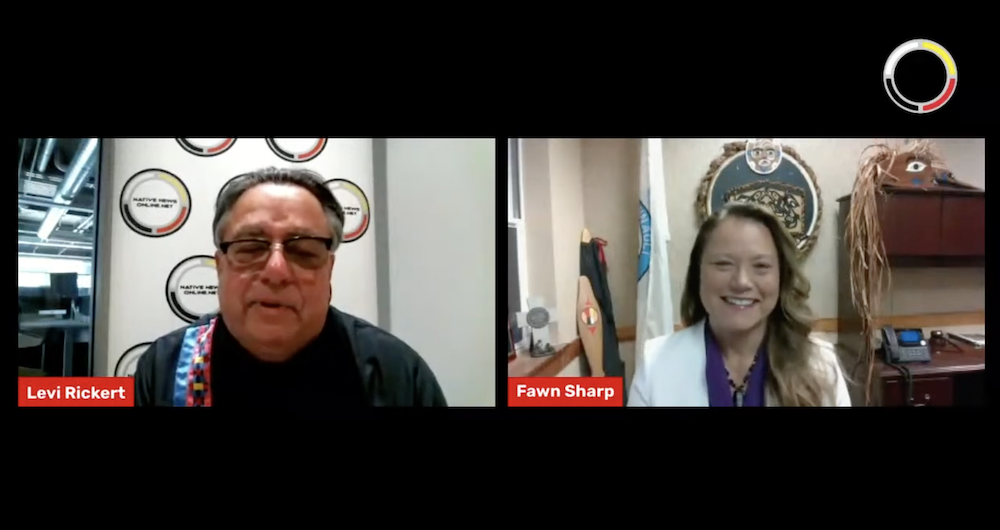
- Details
- By Native News Online Staff
On last week’s Native Bidaské (Spotlight), Editor Levi Rickert welcomed Fawn Sharp, president of the National Congress of American Indians (NCAI) to discuss the accomplishments of Indian Country in 2022.
Sharp, who also serves as vice chair of the Quinault Indian Nation, is currently serving her second term as president of NCAI, the nation’s largest Native American organization, based in Washington, D.C.
In speaking about advancements in Indian Country last year, Sharp cited the approval of advance appropriations for health care; the appointment Mohegan of Chief Marilynn “Lynn” Malerba as treasurer of the United States; the provision with the Violence Against Women Act reauthorization that restores elements of tribal criminal jurisdiction over non-Indians who commit crimes on our reservations; and economic development.
“We have achieved a lot in 2022,” Sharp said.
During the interview, Rickert asked Sharp questions on different topics:
The “Brackeen v. Haaland” case was argued in November before the U.S. Supreme Court that deals with the Indian Child Welfare Act and, ultimately, tribal sovereignty. Do you have a prediction on the outcome?
“It’s going to be a close one. I believe that regardless of the decision, tribal nations, we know that we have an absolute inherent right to make a decision with respect to our children and the future of our children and the rightful place that they have within tribal nations. I want to say we’re going to win. I believe that just hearing some of the arguments and what some of the justices said, we’re convinced that the political relationship side may be favorable.”
After years of trying to get advance appropriations for healthcare passed in federal budgets, it passed this year. Why now?
“It was a combination of a lot of things. If anything, the pandemic revealed just how vulnerable tribal nations are, just how vulnerable we are when we don’t have the funding and the resources to protect basic things like quality of healthcare, like access to healthcare, and our ability to plan for the health needs of our citizens. We have the highest rates of infection and the highest rates of death.
“People were looking around and asking why tribal citizens and tribal nations are suffering at such high and disproportionate levels.
“I think it was just a lot of the things that we’ve been working on in advancing a perfect storm of a global pandemic.”
Tell us why you embarked on the 1,700-mile Sovereignty Run from Oklahoma to California.
“I knew Oklahoma was ground zero, and we had to enlist the voice of all of Indian Country to come together to ground zero of tribal sovereignty attacks. And we wanted to run across the country, elevating the issue and then arrive at the opening of our NCAI annual convention in Sacramento, which we did in ... I can’t even begin to express in words this year’s spiritual journey.
“It was a way to unite all of Indian Country together to stand for tribal sovereignty. There were so many memories along the way, not just personally but as well as professionally — it was an experience we’ll never forget.”
Watch the episode on our YouTube channel, or view in the embedded video below.
More Stories Like This
Native News Weekly (August 25, 2024): D.C. BriefsUS Presidents in Their Own Words Concerning American Indians
Two West Virginia Guardsmen Shot Near White House
Next on Native Bidaské: Chef Sean Sherman Talks “Turtle Island” and the Future of Indigenous Food
Deer Camp: A Family Tradition That Runs Deep
Help us tell the stories that could save Native languages and food traditions
At a critical moment for Indian Country, Native News Online is embarking on our most ambitious reporting project yet: "Cultivating Culture," a three-year investigation into two forces shaping Native community survival—food sovereignty and language revitalization.
The devastating impact of COVID-19 accelerated the loss of Native elders and with them, irreplaceable cultural knowledge. Yet across tribal communities, innovative leaders are fighting back, reclaiming traditional food systems and breathing new life into Native languages. These aren't just cultural preservation efforts—they're powerful pathways to community health, healing, and resilience.
Our dedicated reporting team will spend three years documenting these stories through on-the-ground reporting in 18 tribal communities, producing over 200 in-depth stories, 18 podcast episodes, and multimedia content that amplifies Indigenous voices. We'll show policymakers, funders, and allies how cultural restoration directly impacts physical and mental wellness while celebrating successful models of sovereignty and self-determination.
This isn't corporate media parachuting into Indian Country for a quick story. This is sustained, relationship-based journalism by Native reporters who understand these communities. It's "Warrior Journalism"—fearless reporting that serves the 5.5 million readers who depend on us for news that mainstream media often ignores.
We need your help right now. While we've secured partial funding, we're still $450,000 short of our three-year budget. Our immediate goal is $25,000 this month to keep this critical work moving forward—funding reporter salaries, travel to remote communities, photography, and the deep reporting these stories deserve.
Every dollar directly supports Indigenous journalists telling Indigenous stories. Whether it's $5 or $50, your contribution ensures these vital narratives of resilience, innovation, and hope don't disappear into silence.
 The stakes couldn't be higher. Native languages are being lost at an alarming rate. Food insecurity plagues many tribal communities. But solutions are emerging, and these stories need to be told.
The stakes couldn't be higher. Native languages are being lost at an alarming rate. Food insecurity plagues many tribal communities. But solutions are emerging, and these stories need to be told.
Support independent Native journalism. Fund the stories that matter.
Levi Rickert (Potawatomi), Editor & Publisher

